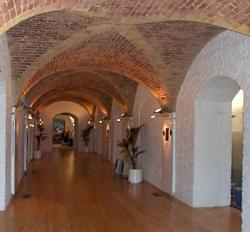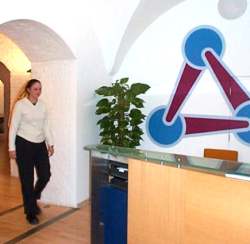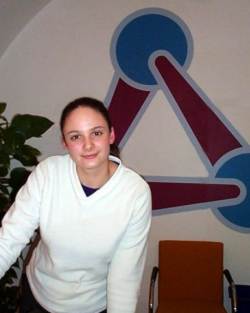Jenni Barker is an astrophysicist. At least, that was the subject of her degree at Birmingham University - but since then she's moved into the realm of communication and journalism where she still finds a use for her scientific and mathematical training. We went to see her at NESTA's office in Upper Thames St., in the beautifully renovated Fishmongers Chambers.
Jenni was brought up in Sussex, in a small village 20 miles from Brighton, and went to an independent girls' school not far from Tunbridge Wells. She won a science scholarship to the school, but once there found that there was little opportunity to pursue scientific interests outside the standard syllabus. She was also keen on music and drama - playing the violin and piano. We asked her: Why science?
Jenni: I was always good at it, I suppose, but not enthusiastic about it until 13 or 14 when one of my teachers gave me a popular science book to read - about relativity. I decided then that I wanted to do relativity at university.
I didn't really enjoy science at school. I didn't think I learnt anything that was really exciting that I wanted to know, but I knew what I wanted to do so I just had to pursue it.
Maths at school was dull - at least until A level - but my parents used to set some interesting challenges, such as finding square roots without a calculator. I liked to play with numbers. I had a good teacher when I was twelve who took us through most of the GCSE course, but after that school maths was less challenging - no-one gave me any extension problems.

The Fishmongers' Chambers
Relativity appealed to me as the kind of science that makes you use your imagination as well, instead of just having to fill in all the facts.
...And I really did enjoy doing the maths. I'd always enjoyed maths since I was tiny. Again, it was being able to use your imagination.
I'd always been fascinated by space so I think it [relativity] just tied everything in.
Plus: Tell us about your A-levels.
Jenni: I changed every week, I think, from wanting to do Maths, Physics and Chemistry, or English French and Music, but I eventually ended up doing the sciences.
Plus: And this led you to...
Jenni: "...do Physics and Astrophysics at Birmingham University"
Plus: Was Birmingham fun?
Jenni: Yes, definitely. But I discovered quite early on that I had rather an idealistic view of what it was to be a scientist. I started writing when I was there. I was editor of Poynter - the physics department newspaper. I realised I wanted to use some of my communications skills as well, so this led me into science journalism. [ed: The Poynter refers to John Henry Poynting, the Birmingham professor famed for introducing the Poynting vector in the field of electromagnetism.]
And that's how I found out about the course in Imperial - an Msc in Science Communication.
Plus: What about outside your studies? After all, university is often the place where people do a lot of growing up.
Jenni: Oh yes, I really enjoyed being away from home - and Birmingham is big enough to have lots to do and explore without being so daunting as London. The choir and orchestra kept me busy too. I got quite involved with the Physics department - organising balls and events - there were a few of us who were possibly a bit different from the average physics student!
Plus: What was the target audience of the Poynter? Were you finding all sorts of interesting bits of physics to write about?
Jenni: Well no, not really. It was more a bit of a jokey paper. Some of it was a newsletter about things going on but generally it was jokes about physics. It was very close to life in the department.
I also did some writing for the Institute of Physics Magazine.
Plus: How did you find maths at university?
Jenni: Well of course astrophysics is a very mathematical subject. It's not so much about looking at stars, but about the equations of the universe and manipulating them. I think the subjects I enjoyed most in physics were the mathematical ones. My final year project was about looking at the evidence for black holes and active galactic nuclei in the early universe, and mapping the visual evidence onto the equations.
Plus: So, we've got you through Birmingham...
Jenni: Oh, the other thing was that I started helping with teaching while I was there - going into schools and talking about what life was like at university. That's how I got to be really interested in education as well.
Plus: How did that arise?
Jenni: There was a scheme - mainly for people wondering whether to be a teacher or not. I knew I didn't want to be a teacher, but I was interested in seeing what it was like, so I went along on Wednesday afternoons to help. [ed: Many education departments run similar schemes. See https://stimulus.maths.org/ for example.]
Plus: Did you take any lessons?
Jenni: No - we were there to help the teachers. We helped with practicals in the younger classes, but the older groups were much more interested in why I'd chosen to do physics at university.
Plus: You left Birmingham in...
Jenni: 98 - and then I went to Imperial College to do the MSC in Science Communication.
Plus: What does an MSC in Science Communication teach?
Jenni: It's a mixture of theory and practical work. It's meant to equip you with a media degree in a year, so it's pretty intensive, but very focussed towards science graduates. Everyone who was on the course - and you have to get through quite a lot of hurdles to get in - was very enthusiastic about communication skills - but, to be honest - we were all writing like scientists. We had no idea of proper journalistic style.

There was also a lot about the history of communication, and how science has been taught in schools - so it fitted in well with my own activities. It was a well rounded course.
Plus: You obviously enjoyed it! What did you like about it?
Jenni: I couldn't believe that I didn't already know the stuff they were teaching. I'd reached the age of 21 without having a clue about how science fitted in to society. It was actually quite a shock to find that it was never taught in any way in university.
And without that course I can't imagine that I would be able to do the job I'm doing now. Not just that, but my perspective on science would never have been the same.
We had our own radio show on Imperial College radio, doing interviews - mostly with students, so it had a much lighter feel than Radio 4. The format was a 1 hour slot - with music, interviews, light hearted science pieces we had pre-recorded. Occasionally we did a more in-depth interview with a specialist, but still aimed at young people.
Plus: Was it difficult to find material?
Jenni: Getting people to come in wasn't easy, but we had the equipment to record interviews properly over the phone. It's surprising how many people are prepared to give just 10 minutes of their time for an interview.
The course is well respected, and I think that a lot of scientists are quite keen to encourage people who know a lot about science to go into journalism, so science is not completely misrepresented in the media in the future.
Plus: So you thoroughly enjoyed yourself there?
Jenni: Oh yes. This is what I'd wanted to do, and the course confirmed it for me. And while I was there I worked for Science Line.
Plus: Tell us about Science Line
Jenni: Science is an information service about science. It endeavors to answer any question about the science that the general public may have.
Plus: The sort of thing that you would use a web site for now?
Jenni: Oh yes - it does have a web site - but it's surprising how many people want to phone and talk to you. Students would phone up and have a conversation about the origins of the universe with you.
We always worked in pairs, and if we didn't know the answers we had a team of experts we could call on. That was great fun - and we'd travel in our bus [a double decker painted with flowers] to various parts of the country and talk to people about science issues such as genetically modified foods. We went down to the eclipse - and were there in the rain. Good fun. [ed: Plus ran an article on this eclipse in issue 9]
Plus: Did you get many mathematical questions?
Jenni: Not specifically, although of course there would often be a mathematical aspect.
Plus: [We have a personal interest here] What did you learn about communicating mathematics? Would you use equations in an article, for example?
Jenni: Well it wouldn't be prescriptive like that. Obviously for the general public an equation would be a waste of time unless it was something really well known like E=mc2. The important thing would be to adapt the style to the target audience.
I always think that one of the biggest problems people have is the concept of how big and small things are. 1032 means absolutely nothing to most people. You have to make comparisons with everyday scales somehow.
Plus: And you also worked at the Science Museum while at Imperial?
Jenni: Yes, I started by writing manuals on procedures for setting up traveling exhibits - so it was quite technical. "Turn screw A" - that type of thing. But then I started helping to design the traveling exhibits, and that was really interesting. We'd start by collecting what could be called fascinating facts. Things that might inspire people's thoughts.
We'd make mood boards and ask the question "What will this exhibit feel like?" One exhibit we did was on cloning, and we started by thinking we'd like a friendly mood because people feel that it's about sterile carbon copies. So we had lots of pictures of babies to emphasise the fact that you can't make a carbon copy of an adult. Then the research starts - and that's quite a lot of work.
Plus: So we're now at September 99? What happened next?
Jenni: I started at NESTA in November. I heard about the job through the course.
Plus: So the MSC at Imperial opens up many career opportunities?
Jenni: Oh yes - it's very well recognised. Quite a few graduates go on to work for the BBC or New Scientist for example. There's quite a community of graduates.
Plus: What is NESTA?
Jenni: It stands for "The National Endowment for Science Technology and the Arts". It was set up with £200 million of lottery money and it invests the interest on this. Roughly 40% towards Inventions and Innovation, 20% to Education and 40% on Fellowships. We like cross-disciplinary projects best.
One of the projects I was working on recently was called Brain Games. It encouraged children to think about their brains and creativity in a scientific way by using games design. A project like that can't easily be categorised as science or art - it's a real mix.
Plus: What are NESTA fellowships?
Jenni: It's about funding scientists, artists or educators to do things that they wouldn't normally find funding for. There are lots of examples on our web site. For example we funded an astrophysicist at Cambridge University who developed an interest in the medical imaging applications of his work. That's something that the normal funding agencies would have turned down.
The Invention and Innovation program is really about finding talented people and supporting them. Most lottery money hasn't been spent on people, but on buildings and institutions, so we try to redress that balance.
Plus: What's your role at NESTA?
Jenni: I work as an education project researcher. People don't normally come to us with projects. We try to find out as much about an area as we can and then we invite people to put in applications for funding.

Plus: How do you do this research?
Jenni: Internet research - and we go to a lot of conferences. Many contacts come through other people in NESTA. A lot of my initial work was trying to identify areas in which NESTA could help. So they'd say "Go and find out what's available for young composers".
You know about MOTIVATE of course. [ed: MOTIVATE is from the Millennium Mathematics Project stable]. That was one of our 8 pioneer projects we funded before the process was up and running properly. MOTIVATE is one of our favourite projects because it's trying something that hasn't really been done before. It's about helping girls and boys perhaps at the top end of the ability range - showing them the possibilities of maths as a career by introducing them to leading mathematicians.
NESTA tries to remove some of the barriers. Although it's about talented people, we believe there are talented people everywhere.
Plus: What are your plans for the future?
Jenni: Well I'm joining NESTA's DfEE [ http://www.scienceyear.com ] Science Year team, so there'll be plenty to keep me busy! [ed: Plus readers may recall the DfEE [ http://www.mathsyear2000.org ] Maths Year 2000 program that is now winding down.]
Plus: Does understanding science help you to explain it?
Jenni: I'm going to say yes. In fact I've had this debate with people quite often. They say that humanities graduates can do the job much better because they are used to communicating. I don't agree with that. I think that it's the difference between trying to communicate something simply and trying to teach. In journalism you can't teach - and perhaps too many scientists fall into that trap. But it does help to know what you are talking about. In science journalism there's a lot of maths and a lot of figures, and if you don't understand them, then you are not going to make a good job of simplifying things.
Plus agrees!
About the author
Mike Pearson is the senior computer officer at the Millennium Mathematics Project.
More from Maths Careers
You can find out more about careers with mathematics on the Maths Careers website, which is run by the Institute of Mathematics and its Applications. In particular you might want to look at this career profile on the Maths Careers site: